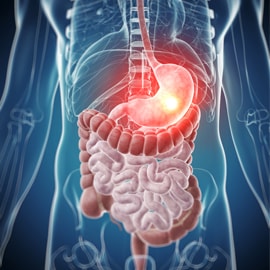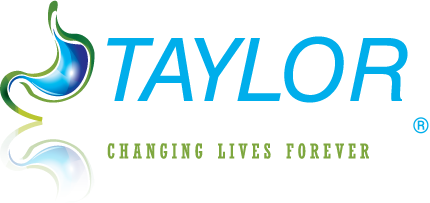Gastrointestinal Concerns after Weight Loss Surgery

Dumping Syndrome
Dumping syndrome is a common issue after gastric bypass and is caused caused by high-fat or high-sugar foods moving from your stomach to your small intestine too quickly to be properly digested. Dumping syndrome can cause the following symptoms:
Immediate:
- Cramping
- Diarrhea
- Nausea
- Vomiting
- Abdominal pain
Two to four hours after eating:
- Anxiety
- Weakness
- Cold sweats
- Lightheadedness
Symptoms may be mild or more intense and often subside within a few hours.
Nausea & Vomiting
Your body will be more sensitive after weight loss surgery. Eating too quickly, eating too much and even strong smells can produce an adverse reaction that leads to nausea and/or vomiting
Remember to follow all of Dr. Taylor’s dietary instructions, and take note of specific foods that seem to upset your digestive system. You should also:
- Make sure portions are appropriately sized.
- Take time to eat and chew slowly.
- Avoid lying down after meals.
- Maintain adequate hydration at all times, especially when feeling nauseous.
Gas
Many people experience increased gas after weight loss surgery, but you can prevent this by avoiding foods that cause excessive gas. The following are examples of things that may cause gas:
- Carbonated drinks of all kinds
- Beans and other legumes
- Certain fruits and vegetables
- Dairy products
- Anything that contains refined sugar or flour
- Splenda
Different foods affect people differently. If you experience bad gas, try to figure out what you ate that may have caused it and avoid that food in the future.
Some products may also help you relieve gas, like:
- Beano
- Devrom
- Papaya enzyme or extract
Constipation
Because your weight loss surgery allows you to feel full on less food, you’ll ultimately be eating less fiber. This can result in constipation, but you can avoid this by staying hydrated and eating plenty of fibrous fruits and vegetables. A few weeks after surgery, you may be able to find relief with mild laxatives or fiber supplements—just be sure to ask Dr. Taylor before doing so.
Safe laxative options include:
- Dulcolax suppositories
- Milk of magnesia
- Mylanta
Diarrhea
Gastric bypass may make it more difficult for your intestines to absorb liquid, and this can sometimes result in loose stools. Some people who have weight loss surgery also find themselves less tolerant of dairy products than they were before and may need to switch to alternatives like soy-based products if digestive issues are apparent after eating dairy. Limiting sugar and consuming adequate fiber is advisable for all patients.
Dehydration
It is absolutely crucial that your body remains adequately hydrated after weight loss surgery. Hydration can help you avoid some of the digestive problems above, along with other concerns like fatigue, lightheadedness and fainting. You will need to drink between 40 and 64 ounces of water every day.
